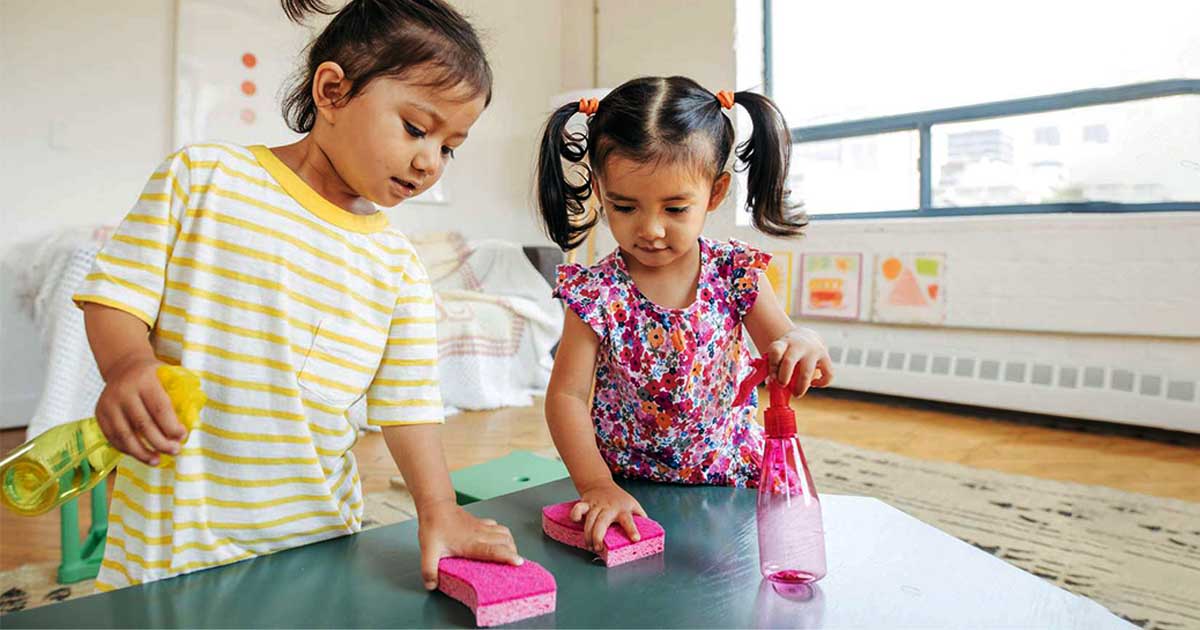The rise of technology means that children can discover, communicate, and get entertained using different digital equipment such as educational applications or social media platforms.
Although it has been associated with negative impacts on growth and health, there are also several positive effects of technology on childhood development to consider.
Consequently, this article aims to examine how technology impacts mental development in children by discussing both positive and negative aspects of digital technology on kids’ brains.
Thus, we shall try to help parents understand the role that technologies play in their kids’ mental capacity, social growth, and emotional well-being, basing our arguments on current research and trends.
Pros of Technology on Childhood Development:
Knowing how technology affects children is crucial in this technological age. Following are a few positive impacts of technology on childhood development:

1. Educational Benefits
Technology can help kids develop and prepare for their future in diverse ways. For instance, learning can be made more accessible and interesting through improved learning with digital tools as well as access to online resources.
These include imaginative applications such as iD Techs or Child Psychs which increase creativity levels, problem-solving skills, and cognitive development that open up the minds of children.
An article by ID Tech research group shows that the present-day educational climate cannot keep up with students’ demands hence there is a need for the use of modernized methods like e-learning to realize desired outcomes.
2. Preparing for Employment
Considering that tech jobs are projected to occupy most positions in the job market, early introduction to these devices is important among the young ones too. Also, skills such as coding and digital literacy acquired through technology have been found indispensable over time making them necessary for employment seekers.
One company known to advocate for early IT experiences is iD Tech; it prepares these children mentally so that they can live in an increasingly digital world.
3. Building Social Relationships:
Even during a pandemic situation, children use technology to keep connections with people they love or whom they value most. There are also technological chances offered within child development where virtual interaction takes place hence also enabling relationship creation.
According to a study written by Child Psych’s Journal showing how communication helps bind societies regardless of where individuals reside geographically.
4. Children’s creativity:
Unlike before, the effects of technology on Childhood Development allow youngsters to express their innovative thoughts in various ways; therefore, they may express themselves differently or even make things differently i.e. using computer programs to draw art pieces or compose music via computers amongst others.
Activities like creative technologies foster self-expression while developing confidence.
5. Accessibility of Information
The Internet provides a lot of information about almost every subject, so children can find multiple sources to learn about different aspects of life. Kids can follow their passions through technology that allows them access to educational videos and online libraries.
Furthermore, digital platforms encourage teamwork and co-learning thus bringing together children with experts and peers from various countries or continents.
Even though technology has many advantages for young people, its complexity as far as its impact on them is concerned has been increasingly becoming evident. These include things like supporting learning, growing innovation skills, encouraging social interaction as well as enhancing future generations’ imaginative capacity among others.
Instead of hurting our children, we can make technology empower them during this dynamic era.
Read More: Instill A Love Of Learning In Children: 10 Effective Tips For Parents!
Cons of Technology on Children and Development:
Take, for example, technology that is used everywhere but still has some negative sides and issues that children should know about before starting to use it.

Therefore, we will analyze the adverse effects of technology on childhood development:
1. Health and Developmental Risks:
By being omnipresent in our lives, technology makes young people vulnerable because it exposes them to various health conditions. This includes obesity caused by prolonged screen time, musculoskeletal disorders, sleep disorders, and decreased physical activity.
According to research from Maryville University Online and Regis College Online; Technology has several harmful impacts on child development such as frequent exposure to blue light emitted by screens leading to disrupted sleeping patterns.
Other than that, too much screen time also leads to sedentary activities which can cause many other health complications posing future dangers for young humans.
2. Mental Health Concerns:
This ranges from increased anxiety and depression among young people who excessively use technology or get addicted to it. The prevalence of social media platforms as well as cyberbullying trends further worsens the situation.
Research indicated by Maryville University Online and Regis College Online brings out a pessimistic scenario linked with digital technologies regarding mental wellness calling for precautionary measures aimed at reducing these risks.
3. Cognitive and Social Skills Impact:
However, unmonitored use may be detrimental to children’s cognitive abilities as well as their interpersonal engagements. As a result, spending too much time engrossed in gadgets reduces attention span thereby affecting personal behavior over long periods.
Furthermore if one moves rapidly between digital stimuli no cognitive processing occurs due to inattention thus lack of focus
Additionally, heavy reliance on digital communication tools discourages face-to-face interaction so young people do not know anymore how they should behave when they are faced with these situations more often than not these days.
Digital balanced Child Psych Insights suggests the importance of balancing online involvement with offline activities for healthy cognitive development alongside socialization purposes.
4. Academic Performance:
However, while it offers valuable educational resources, too much screen time also leads to poor academic performance.
Research shows that prolonged screen engagement diverts one’s attention from completing assignments and studying resulting in low marks during academic examinations. In addition, digital devices are addictive and kill concentration as well as productivity by drawing children away from their schoolwork.
Parents and educators should thus control the time that young ones spend on these screens so that it enhances rather than undermines their grades at school.
5. Behavioral Issues:
Also, excessive exposure of children to screens escalates aggressiveness, impulsivity, and defiance among others. Too much stimulation from digital gadgets disrupts emotional regulation causing behavioral issues.
Accordingly, the online content consumed by this age group may expose them to violent or inappropriate materials which can condition them for aggressive behavior making a negative impact on how they behave.
As such it is important to reduce the harmful effects of technology on child wellness.
Read More: 5 Damaging Impact of Social Media on Children
Tips To Manage the Effects of Technology On Children
In this digital era, some parents may feel overwhelmed by the demands of parenting; nevertheless, there are strategies to help them deal with how technology influences their children.

The following are ten ways parents can mitigate the effects of technology on childhood development.
1. Set Boundaries:
To reduce the negative effects of technology on children, Parents should have consistent rules about screen time and device use so that children know what is expected of them and develop good habits early on. When these limits are set by parents it provides a structure for responsible usage of technology.
2. Be a Role Model:
Parent’s actions determine how technology affects child development as they influence their child’s behavior and attitude towards it. For instance, by balancing off-screen time with real-life experiences such as talking to people face-to-face instead of using phones all the time, they teach the importance of having a balanced life to their kids.
3. Create Tech-Free Zones:
Having areas in the house where no gadgets are allowed would encourage family bonding hours or promote better sleep across the whole household. Parents are supposed to ensure that electronic devices cannot be used in places like bedrooms or even dining halls making kids unplug from screens.
4. Encourage Physical Activity:
Unlike days gone by routine physical exercise must be encouraged along with sedentary screen time which has become very common reducing children’s access to physical activities; thus, parents need to arrange sports sessions, bike rides or nature walks among others.
5. It Is All About Quality Content:
This involves directing children towards educational or enriching digital materials ensuring that they only have productive screen times and not just beneficial ones. Parental control options can aid in limiting exposure as well as filtering software while encouraging them at different stages of growth to find age-appropriate content
6. Facilitate Communication:
Consider choosing to communicate with your child directly to reduce the effects of technology on children. Another way you can do that is by making them join clubs and other social events where they have to physically interact with people.
7. Teach Internet Literacy:
The key to children’s safety and welfare is teaching them how to actively use the Internet responsibly. In addition, by teaching online safety, privacy settings, and critical thinking among other things parents equip their children with skills enabling them to discern facts from fallacies while on the web
8. Manage Screen Time:
To know whether kids follow set guidelines as well as how many hours they spend in front of screens parents can observe this. To strike a healthy balance between activities performed offline as well as those carried out using Wi-Fi, parents can make use of parental control tools like screen time tracking apps for instance.
9. Encourage Other Activities:
This will ensure that kids develop holistically thus reducing dependence on screens; moreover, mothers promote the all-round growth of their children through practical learning experiences aimed at creating meaningful connections among peers and family members.
10. Keep Abreast With New Developments:
This becomes evident in the way parents try to determine the appropriate times for their children to access the internet so that they cannot be deceived or harmed.
Read More: 10 Effective Consequences for Kids’ Bad Behavior You Need To Use!
A Word From Mind Family
Mind Family, for example, acknowledges the impact of technology on the growth of children. In addition to its merits, we must handle these difficulties with care.
We aim to help parents navigate through the digital world and establish a healthy relationship between their children and technology.
We appreciate what parents go through in this era where kids are being raised, that’s why we give them practical advice, tools, and mentorship as well so that they can maneuver technological complexities in ensuring it adds value not subtract from their child’s life.
Therefore, let us work together so that our kids enjoy what technology has to offer while at the same time safeguarding their welfare thereby making them future outstanding citizens.
Frequently Asked Questions (FAQs)
1. What are the pros of technology on childhood development?
The pros of technology on childhood development include enhanced education through interactive learning tools, preparation for future tech-based jobs, improved social connections, creative expression opportunities, and access to vast information and resources.
2. What are the negative effects of technology on children?
Negative effects of technology on children encompass health risks like obesity and sleep disturbances, mental health concerns like anxiety and addiction, cognitive and social skill impacts, academic performance decline, and behavioral issues.
3. What are some tips for managing the effects of technology on children?
Tips for managing technology’s effects on children include setting clear boundaries, leading by example, creating tech-free zones, encouraging physical activity, emphasizing quality content, fostering communication, teaching digital literacy, monitoring screen time, promoting alternative activities, and staying informed.











